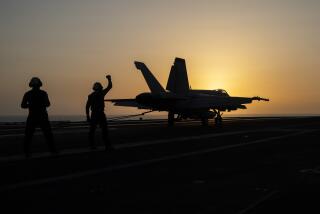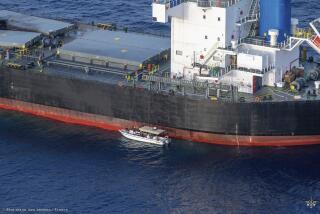General Takes Blame for Ship That Got Away : Gulf: U.S. commander in region tells how his forces lost track of vessel suspected of carrying Scud missiles to Iran.
- Share via
WASHINGTON — A day after American forces let a North Korean ship slip into Iran with a suspected cargo of Scud missiles, the commander of U.S. military operations in the Middle East accepted full responsibility for the lapse.
“If you are looking for the guy that’s responsible for letting the (Dae Hong) Ho go through, you’re looking at him,” Marine Gen. Joseph P. Hoar, commander in chief of the Central Command, told the House Armed Services Committee.
He told lawmakers that U.S. naval forces first concentrated their search for the North Korean vessel close to the narrow Strait of Hormuz, along the territorial waters of Pakistan and Iran. Not finding it there, Hoar said, the naval forces were ordered to “move that search out to sea,” and apparently jumped over the location of the North Korean ship.
He called the search for the ship “a concerted effort over a period of 10 days.”
The Bush Administration had considered using the embargo against Iraq to stop and board the ship, even though it was bound for Iran. Doing so would have provided an opportunity to prove what intelligence reports have indicated--that North Korea is continuing to supply missile technology to the region, despite the Koreans’ denials.
Had the ship carried missiles--but also proper documents reflecting that--the Navy would have had to let it proceed, having no authority to stop trade to Iran. If the ship’s documents misrepresented its cargo or its destination, the United States would have turned it away. But the Americans then would have had to defend to skeptical Persian Gulf allies their decision to use the Iraq naval embargo to stop a ship headed for Iran.
Officials said Wednesday that, because the Navy was unable to search the ship, or to cue intelligence satellites that the vessel was in port and unloading its cargo, they will remain uncertain whether the new generation of missiles have entered Iran’s arsenal.
“What we have lost by our failure to pick up that ship is we would have been able to alert our intelligence colleagues to determine more specifically what was there,” Hoar told House members.
After discovering that the ship had slipped into the Iranian harbor unnoticed, Pentagon officials discounted the importance they had attached to finding and stopping the North Korean vessel.
Pentagon spokesman Pete Williams said that “it would have been nice to have found the ship” but, because it was delivering goods to Iran and not to Iraq, the Navy’s failure to locate the Dae Hong Ho was not a serious lapse.
In Brussels, Secretary of State James A. Baker III continued to emphasize the Administration’s concern over the apparent missile delivery’s effect on the balance of military power in the region. “I rather suspect that we will pass a message to the government of Iran letting them know of our concerns,” Baker told reporters.
On Capitol Hill, Hoar warned the committee that, besides buying a new generation of Scud missiles, Iran is intent on acquiring heavily armed, fast-attack boats from China and submarines from Russia. Those, he warned, could seriously change the balance of power in the region.
“What is most concerning to me about Iran, and I must say among the nations of the Gulf as well, is the acquisition shortly of missile patrol boats from China and . . . the submarines,” Hoar said. “Those weapons add an entirely new dimension to the threat in the Gulf.”
Hoar said the United States has urged Russian leaders not to sell Iran the Kilo-class submarines it sought. He added that Russia appears willing to call off the sale “because of the some $400 million of back bills Iran owed Russia.”
More to Read
Sign up for Essential California
The most important California stories and recommendations in your inbox every morning.
You may occasionally receive promotional content from the Los Angeles Times.














